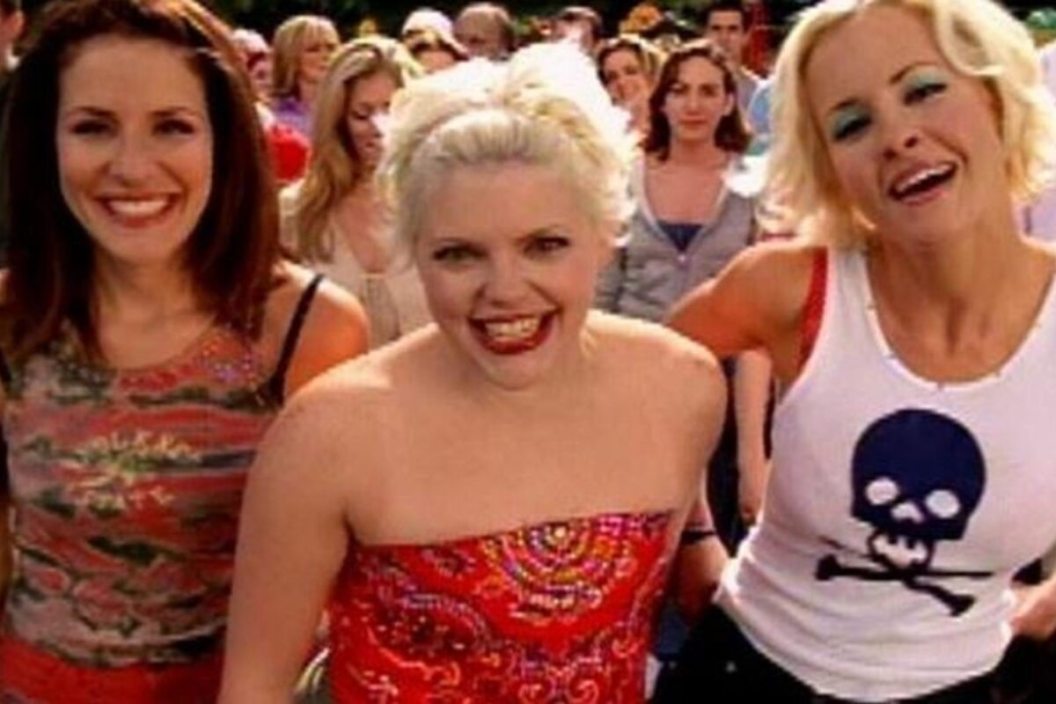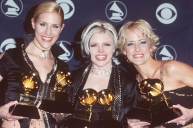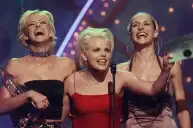In 2000, The Chicks (formerly known as the Dixie Chicks) were the biggest band in country music. Their 1998 release Wide Open Spaces was a breakout smash, selling over 14 million copies. Their follow up album, Fly, spawned two Top 10 singles and they were in the middle of a hugely popular U.S. tour. Riding high from the success of "Cowboy Take Me Away," the trio started getting unsolicited radio play from an unlikely album cut. That song would become one of the most controversial and epic revenge songs in country music history — "Goodbye Earl."
Black-Eyed Peas and Tennessee Ham
The story of "Goodbye Earl" begins a few years earlier. Songwriter Dennis Linde, who penned Elvis' 1972 hit "Burning Love," had already written a string of songs featuring a character named Earl. Earl was most prominently featured in Sammy Kershaw's 1993 hit "Queen of My Double-Wide Trailer," in which he attempts to steal the protagonist's girlfriend with his mechanic skills.
"He rebuilds engines and his name is Earl/He's the Charlie Daniels of the torque wrench," Kershaw sings.
Linde decided to kill off the detestable Earl for good, writing a story song about two longtime friends, Mary Ann and Wanda, who kill Wanda's abusive husband Earl by cooking up a mess of poisoned black-eyed peas. They wrap him up in a tarp and toss him in a nearby lake. Eventually, the town notices he's missing but no one really cares because he's an awful person. In the song's conclusion, the women open up a roadside stand selling Tennessee ham and strawberry jam and presumably live happily ever after.
Sons of the Desert originally recorded the song in the late 90s for an album on Epic Records. Due to a dispute with the label, the song never made it onto an album. In the meantime, the Dixie Chicks claimed the song for their own.
It's difficult to imagine anyone but The Chicks recording the song. Natalie Maines delivers the tale with a wink and vindication. Immediately, it was clear that the song was something special. It was also immediately controversial.
According to the L.A. Times, about 20 out of the 149 radio stations tracked by Radio & Records refused to play the song when it was released. Some stations held town meetings to gauge public reaction. Perhaps expecting something more akin to a mass CD smashing and public protest, programmers were surprised to find that the song actually resonated with many people. Some stations chose to play the song along with a message to victims of domestic abuse to call the 24-hour domestic abuse hotline.
Of course, "Goodbye Earl" was not without its detractors. The trio was accused of advocating premeditated murder. The album's liner notes included a disclaimer: "The Dixie Chicks do not advocate premeditated murder, but do love getting even."
The song's popularity was heightened by its cinematic music video, directed by Evan Bernard and featuring Lauren Holly as Mary Ann, Jane Krakowski as Wanda and Dennis Franz as Earl. Adrian Pasdar, who would go on to become Maines's husband in 2000, even played one of the cops. (The couple is now divorced.) The video won the Academy of Country Music and Country Music Association award for Video of the Year.
Read More: How the Dixie Chicks' 'Fly' Took the Trio to New Heights and Changed the Country Music Landscape
Gunpowder and Tennessee Whiskey
"Goodbye Earl" wasn't the first country song or video to depict domestic violence. Garth Brooks sparked controversy when he featured an abused wife seeking vengeance in the video for "The Thunder Rolls." That video was initially pulled off the air by The Nashville Network and CMT and later put back in the rotation with a disclaimer.
Martina McBride's "Independence Day," written by Gretchen Peters, is a heart-wrenching tale about a woman who sets fire to her home, killing her abusive husband.
And it certainly wasn't the first country song to involve murder. "The Knoxville Girl," an Appalachian murder ballad popularized by the Louvin Brothers in 1956, tells the story of a man who murders a woman while on a date. He's later consumed with guilt and goes down to the county jail to turn himself in. And we can't forget about that prisoner in Folsom who shot a man in Reno just to watch him die.
The difference? "Goodbye Earl" had a happy ending and the Chicks seemed to be having a whole lot of fun. (Hand-clapping and nah nah nahs were previously unheard of in murder ballads.)
While the characters in "The Knoxville Girl" and "Folsom Prison Blues" went to prison and presumably spent their days reflecting on their past, in "Goodbye Earl" there's no hand-wringing over Mary Ann and Wanda's actions. There's no pontificating on the state of their eternal soul.
And unlike stories from murder ballads of old, Mary Ann and Wanda weren't perpetrators of senseless violence. Maybe they just saw a way out. Like Martina McBride sings in "Independence Day," the message of "Goodbye Earl" seems to be: "I ain't saying it's right or it's wrong, but maybe it's the only way."
"Goodbye Earl" helped pave the way for more songs about wronged women seeking retribution.
In Miranda Lambert's "Gunpowder & Lead," the narrator waits for an abuser by the door of their home with a lighted cigarette and a loaded shotgun. "I'm gonna show him what little girls are made of — gunpowder and lead," Lambert sings.
In Carrie Underwood's "Church Bells" a young wife escapes domestic violence by "slipping something into his Tennessee Whiskey."
Whether by Tennessee Whiskey or black-eyed peas, "Goodbye Earl" allowed vengeance to be had — at least in song.
"Goodbye Earl" Lyrics:
Mary Ann and Wanda were the best of friends
All through their high school days
Both members of the 4H club, both active in the FFA
After graduation, Mary Ann went out lookin' for a bright new world
Wanda looked all around this town and all she found was Earl
Well, it wasn't two weeks after she got married that
Wanda started gettin' abused
She'd put on dark glasses or long sleeved blouses
Or make-up to cover a bruise
Well she finally got the nerve to file for divorce
And she let the law take it from there
But Earl walked right through that restraining order
And put her in intensive care
Right away Mary Ann flew in from Atlanta
On a red eye midnight flight
She held Wanda's hand as they worked out a plan
And it didn't take 'em long to decide
You're feelin' weak? Why don't you lay down and sleep, Earl
Ain't it dark wrapped up in that tarp, Earl?
They searched the house high and low
Then they tipped their hats and said, thank you ladies
If you hear from him let us know
And summer faded into fall
And it turns out he was a missing person who nobody missed at all
Out on highway 109
They sell Tennessee ham and strawberry jam
And they don't lose any sleep at night, 'cause
We'll pack a lunch, and stuff you in the trunk, Earl
Is that alright? Good! Let's go for a ride, Earl, hey!
Ooh hey hey hey, ummm hey hey hey, hey hey hey




